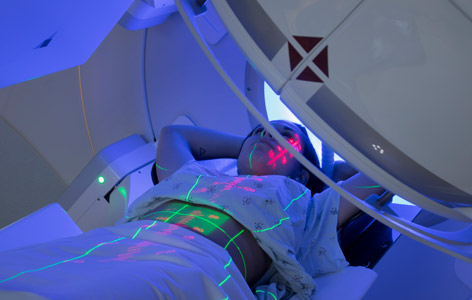Home page Description:
Artificial intelligence (AI) used to fast-track cancer therapy and conserve clinical resources.
Posted On: February 15, 2017

Image Caption:
Radiation therapy requires precise targeting and planning to account for a patient’s unique anatomy and tumour shape.
Personalized radiation therapy plans must be devised on a patient by patient basis to ensure radiation is directed to the tumour while avoiding the nearby healthy organs. Generating this plan can take days of work by a team of highly trained experts—a process that consumes a large amount of clinical resources.
To address this issue, researchers at UHN have developed ways of using artificial intelligence (AI) to automate the production of radiation therapy plans. The technology, known as ‘AutoPlanning’, was developed by UHN’s Dr. Thomas Purdie and is able to create a treatment plan in minutes.
The technology has been licensed to RaySearch Laboratories AB of Sweden with the help of UHN’s Technology Development and Commercialization Office.
“AutoPlanning has a machine-learning engine that automatically learns from existing patient plans to determine the best plan for a new patient,” explains Dr. Purdie. The system analyzes a new patient’s scans, and compares them against a database of thousands of previous patients and their radiation therapy plans. By finding cases with similar features, the system can then rapidly adapt a plan to the new patient.
Johan Löf, CEO of RaySearch, says: “This technology has the potential to make a huge contribution to patient care. I am delighted to be able to bring its benefits to centers around the world as part of the RayStation platform.”
To learn more, please see the RaySearch press release.
To address this issue, researchers at UHN have developed ways of using artificial intelligence (AI) to automate the production of radiation therapy plans. The technology, known as ‘AutoPlanning’, was developed by UHN’s Dr. Thomas Purdie and is able to create a treatment plan in minutes.
The technology has been licensed to RaySearch Laboratories AB of Sweden with the help of UHN’s Technology Development and Commercialization Office.
“AutoPlanning has a machine-learning engine that automatically learns from existing patient plans to determine the best plan for a new patient,” explains Dr. Purdie. The system analyzes a new patient’s scans, and compares them against a database of thousands of previous patients and their radiation therapy plans. By finding cases with similar features, the system can then rapidly adapt a plan to the new patient.
Johan Löf, CEO of RaySearch, says: “This technology has the potential to make a huge contribution to patient care. I am delighted to be able to bring its benefits to centers around the world as part of the RayStation platform.”
To learn more, please see the RaySearch press release.

